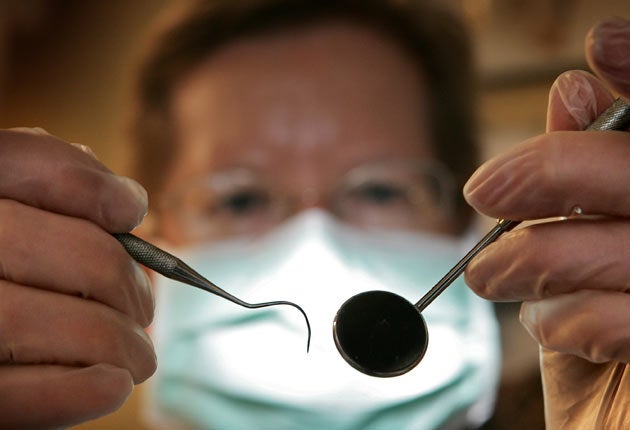Robert Chalmers doesn't like... Dentists

There are certain thoughts you should never voice to a dentist. One of them – I found this out the hard way, when I was 13 – is: "Why, when you take the afternoon off, can you just call up and cancel, but when we do it, it costs £20? How does that work?"
Like most dentists, my then practitioner knew that talking to a patient is a vital part of the process. So he didn't reach for an implement straightaway. What he said was: "I had to drive my mother to A&E; is that good enough for you?"
Then he picked up a syringe and slammed a needle directly into the nerve connected to what, after years of enduring dentistry, I've learned to call my upper right three.
You will say, with some justification, that I deserved that – if not for nauseating precociousness, then for stupidity.
If the same thing ever happens to you, you'll discover that, strangely enough, it doesn't feel quite like you'd expect. The sensation is something like an atomic bomb going off in your head.
When this dentist did administer pain relief (something he considered a waste of money, but necessary to attract a constituency that represented a significant percentage of the population – cowards) he'd wait for a time, usually around three seconds, before firing up the loudest and most fearsome of his drills.
"If somebody doesn't keep still," he once told me, "somebody is going to get a drill through their lip."
Perversely, the most horrible aspects of the experience were peripheral. Would even the Waffen SS have stooped to torturing victims to the accompaniment of Barry Manilow? Or have them wait in a room that was silent apart from drill noise, distant, muffled pleas, and the hiss of the airstone in the fish tank?
The aquarium in the waiting room, like the music in the surgery, was supposed to calm the nervous patient. But for many of us, the effect operated in reverse, so that even today the sight of a neon tetra, or the sound of the opening bars of "Copacabana", can trigger a whole series of hideous recollections. An hour or so later, on the bus ride home, one side of your face would start, very slowly, to go numb.
Back then in the Seventies, in the area where that dentist operated (a place which our lawyer has advised me to describe as "in or around the northern hemisphere") such experiences were far from unusual.
You could tell that the dentists didn't enjoy it either. Stress and loathing are contagious. I've had dentists who've been incompetent, nervous wrecks, and alcoholics. ("Never," one said, "come to see me before three o'clock on a Monday." "Why not?" "Just don't.")
"You had it easy," one friend told me. "Mine had draped an Irish tricolour in the surgery, reeked of Jameson's, and sang rebel songs as he drilled. He was one of the few men in England who embodied the three supposed weapons of the Spanish Inquisition: fear, surprise, and a fanatical devotion to the Pope."
British dentistry has changed, radically. In the 1930s, a dowry sometimes included the extraction of all the bride's teeth, to avoid future expense. For decades after the war, under the NHS, the trade was basically paid on piecework, so that really wicked dentists, many of whom arrived from former colonies, would drill and fill the mouth from ear to ear (the so-called "Australian Trench".)
These days (you may have seen a recent Channel Four Dispatches programme on this subject) an NHS dentist, if you can find one, is paid an ungenerous fee per course of intervention. This encourages minimal treatment, and tempts unscrupulous practitioners to recommend costly private work.
The reality now is that, when really major work is required, the poor suffer, the bold fly to Moldova, and the rest of us pay the going rate.
I currently have the most extraordinarily gifted dentist I've ever had the good fortune to meet. That said, having shattered two molars, I'm faced with a treatment plan that costs the same as a newish Ford Fiesta.
Even though I've never had a hint of discomfort from my current dentist, a yellow card on my wall reminds me that, even as I type this, I'm supposed to be in the chair. Not to worry. I'll pay the fine. Some memories are very hard to erase.
A few years ago, BBC Radio 4 ran a competition asking listeners to explain which era they would most have liked to be born in. The winner chose the 20th century and, by way of explanation, submitted the single word: "Anaesthetics."
Subscribe to Independent Premium to bookmark this article
Want to bookmark your favourite articles and stories to read or reference later? Start your Independent Premium subscription today.

Join our commenting forum
Join thought-provoking conversations, follow other Independent readers and see their replies